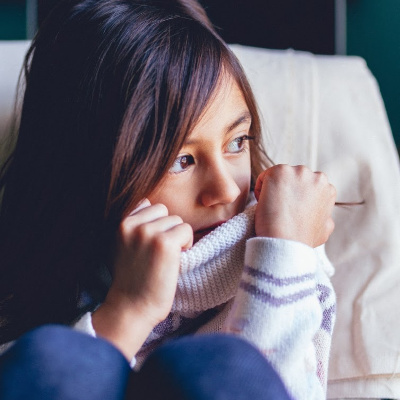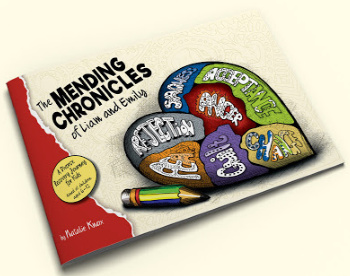 If divorce is confusing for adults, imagine how it is for your kids. It seems like everything in their world is changing and they have no control over any of it. It’s up to you to help your kids understand divorce.
If divorce is confusing for adults, imagine how it is for your kids. It seems like everything in their world is changing and they have no control over any of it. It’s up to you to help your kids understand divorce.
We often hear that children are resilient and adaptable.
I also hear parents say that the kids know that the marriage is ending but they don’t know much about why. The parents think they’ve kept their disagreements private. They think they’ve shielded the kids from the undercurrents in the troubled marriage.
The kids seem to be doing just fine. They’re carrying on as normal.
But is this what is really happening?
Even when you think you’ve protected your kids, they know more than you give them credit for. Children know something isn’t right because their normal has changed. They see changes in routines at home.
They may be carrying on their usual but is that because they’re keeping a lid on their emotions? Are they struggling to label what it is they’re feeling? Are they trying desperately not to cause a disagreement between mom and dad?
Joining me for this Conversations About Divorce to talk about helping your kids understand divorce is Natalie Knox. Knox is a primary school teacher and has been a lay counselor for children in crisis including general on-call trauma counselling and specialized divorce recovery counselling. Knox is also the author of The Mending Chronicles of Liam and Emily, a divorce recovery journey that’s aimed at kids aged 6 – 12.
Listen in below or keeping reading …
Children Have Misconceptions About Divorce
While you may have done your best to shield your child from what’s going on, they know something is up. And absent information from you, they draw their own conclusions about why. Knox has found the most common misconceptions children have to be:
- The parent who leaves did so because they don’t love them anymore
- They are afraid that the parent who stayed will also leave
- It’s their fault. They think back to a big event where they had a role and connect the dots from that event to their parent leaving.
That may seem irrational but think about what you do when you don’t know the truth.
“If you think of a situation that’s going on, you tell yourself a story,” said Knox. “You tell yourself your truth. Children are no different. They see what’s going on and they tell themselves, this is what’s happening and it because of this or that.”
Personally, I found that many of my children’s assumptions were based one what they knew about friends of theirs whose parents had divorced. They took those experiences and thought that’s how it’s going to be for them. Knowing your children’s friends and their home life may help you anticipate some of their concerns.
Boys React Differently From Girls
Through her work, Knox has observed that boys generally react differently to divorce than girls. Boys tend to have anger and they act out on that with a lot of aggression. Girls, on the other hand, tend to be more fearful.
It’s not surprising. Often, divorce means so much about their lives is changing – where they live, their pets, their friends.
“If you think of us as adults when we go through that, it just upsets us,” said Knox. “It makes us fearful. We think of things that are coming in the future and we just suffer from anxiety.”
Those fears and anxiety are compounded for children because they have so little control over any of the changes.
Watch For Changes In Behavior
You know your child. You know their normal. Any change from that normal is an indicator that your child may be concerned about what is going on.
As examples of changes Knox gives if your child starts to have nightmares or starts wetting the bed when they had outgrown that, lots of tantrums or just a small thing that sparks them off with a huge angry outburst. Self-harming is a big warning sign.
It is however easy to miss these changes when you yourself are struggling to get through each day. And your child maybe doing their best to keep things together around you. Knox recommends bringing in some reinforcements and reaching out to a few other trusted adults who interact with your child on a regular basis. They may be grandparents, sports coaches or teachers.
Make sure you open the door to feedback from those people. They have to be confident that if they do give you feedback, you’re not going to snap at them or say, ‘don’t be stupid.’
Make Time For Conversation
Any noticed change in behavior warrants a conversation. Don’t discount it and dismiss it as a one-off.
“The first step would be to slow down and just invest time in being with them,” said Knox. “By that I mean making time for conversations, making time to check in and say, ‘how are you?’ And leaving space for the children to pluck up courage to say I’m feeling this or ask questions.”
Making time for conversations means finding a time when you can focus on your child and shutting out other distractions like the TV. Trying this when your child is working on their homework isn’t going to be productive. Lots of parents do find time in the car great for conversations. That you don’t have eye contact can make it less threatening and there’s no walking away for either of you.
Should You Involve A Therapist?
Involving a therapist or counselor may be helpful but Knox believes that most families are well-equipped to handle what is going on. This goes back to spending time together and opening up conversations. Supporting your child doesn’t have to be limited to just mom and dad. It could be grandparents too.
Help Your Child Describe Their Feelings
The key for conversations with your child is to talk not just about incidents that have happened but more importantly, how the specific event made your child feel. You have to ask leading or probing questions that will help your child express their deeper feelings and emotions.
“I have found in divorce recovery emotional intelligence is hugely important,” said Knox. “By that I mean a child being able to read their feelings, to be able to talk about their feelings and use a good vocabulary and be able to express themselves.”
Knox gives the following example:
Parent: How was school today?
Child: I was angry with my friend.
Parent: Well, were you just annoyed or were you furious?
Asking about being annoyed or furious gives you a gauge to your child’s feelings and provides your child with a way for they themselves to assess their own reaction. Children (and adults!) often lack the vocabulary to express themselves in a more nuance way.
If you keep asking leading questions you might find that your child left the house in the morning feeling horrible because you lost your temper with her at breakfast. Then the outburst with the friend triggered what your child was already feeling.
Finding The Right Words
Being able to accurately describe our feelings is an important life skill and especially for children experiencing divorce.
“Having the right words gives us power,” said Knox. “It makes us more comfortable talking about the situation or it allows us to be able to express what’s going on inside of us.”
Living in Spain, as a non-native Spanish speaker, Knox has experienced the frustration that comes from not being able to ask precisely the right question or to fully comprehend what a Spanish-speaking doctor is telling her. That’s a good analogy for how your child might feel.
That’s why Knox stresses the importance of going the next step when your child uses a high-level emotion word like anger or even happy. Anger could mean frustration or disappointment. Happy could mean relieved. You just won’t know if you don’t ask.
Focus On Your Child’s Experience
 When you’re having conversations with your child about understanding divorce, it’s about listening to your child. As much as you might want to, avoid jumping into problem-solving mode and don’t get defensive. Either of those responses could easily shut down the conversation.
When you’re having conversations with your child about understanding divorce, it’s about listening to your child. As much as you might want to, avoid jumping into problem-solving mode and don’t get defensive. Either of those responses could easily shut down the conversation.
That’s where using a book like The Mending Chronicles of Liam and Emily which offers vocabulary and writing prompts, could be helpful.
“The focus for my book and for a child working through the book would be, what is your story? What is your understanding? This is your journey,” said Knox. “Mom and dad need to just give the child that space, that safe space to be able to write down their perspective of things.”
Be mindful that everyone experiences a situation differently. That means you can expect each of your children to have different perceptions and reactions to what is going on.
My guest for this Conversations About Divorce was Natalie Knox. Knox is a primary school teacher and has been a lay counselor for children in crisis including general on-call trauma counselling and specialized divorce recovery counselling. Knox is also the author of The Mending Chronicles of Liam and Emily, a divorce recovery journey that’s aimed at kids aged 6 – 12.
Photo by Joseph Gonzalez on Unsplash